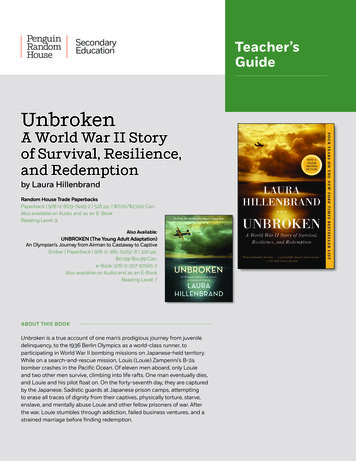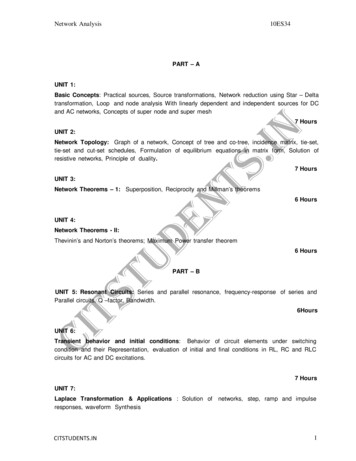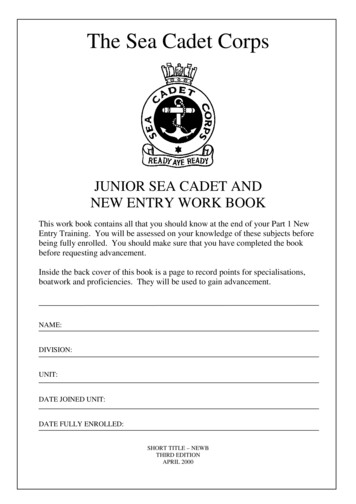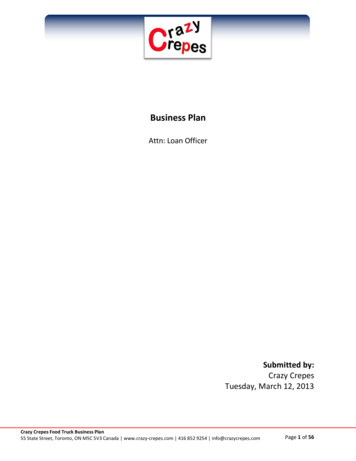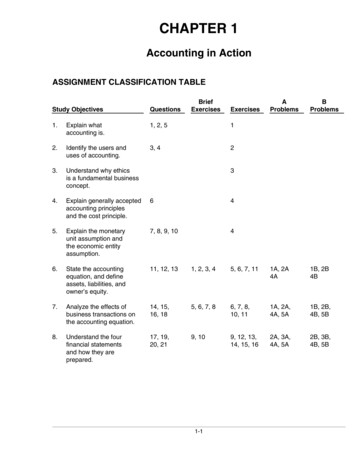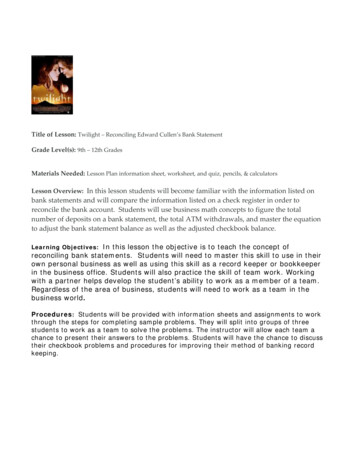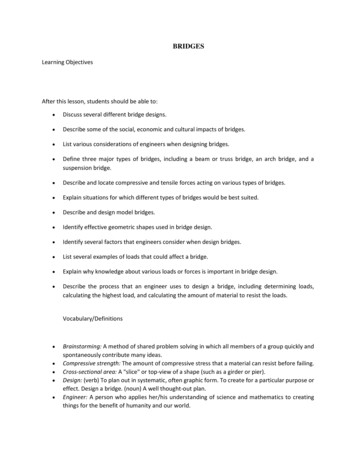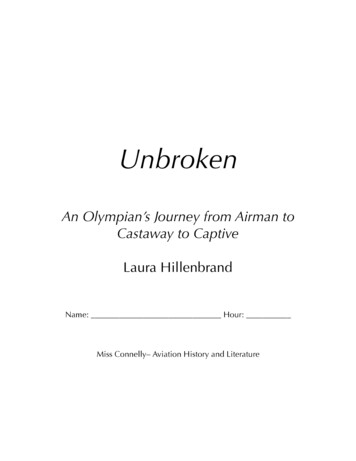
Transcription
UnbrokenAn Olympian’s Journey from Airman toCastaway to CaptiveLaura HillenbrandName: Hour:Miss Connelly– Aviation History and Literature
Who is Louie Zamperini?Where does he live/grow up?Who is his family?What is he good at?What is he bad at?Three words to describeLouie are:Describe some of Louie’slife experiences:Olympian:Airman:Castaway:Captive:What makes Louie happy?What are Louie’s biggest fears?Describe how Louie changes as a person from the beginning of his story to the end:
The Setting:World War II in the Pacific Theatre:-The Two “Sides”: Allies: Axis:-Important Dates: Attack on Pearl Harbor: Outbreak of World War II (for the United States): Invasion of Normandy (D-Day): V-E Day: Atomic Bombs:-Hiroshima:-Nagasaki: V-J Day:-Identify the Following: Chester W. Nimitz: Douglas MacArthur: Manhattan Project: kamikaze: island hopping:
-The Battles: Midway: Guadalcanal: Iwo Jima: Okinawa:Louie’s Journey:JIHABGCFED
Use the map on the previous page to outline what happened to Louie in the followingplaces; refer to this link as reference: : Torrence:B: Oahu:C: Crash Site:D: Funafutti:E: Nauru:F: Kawajalein:G: Wake Island:H: Ofuna:I: OmoriJ: Naoetsu:
The Cast of Characters:As you “meet” the following characters, write a brief description of each:Pete Zamperini:Louise Zamperini:Sylvia Zamperini:Lt. Russell Allen Phillips (Phil):Super Man:The Green Hornet:Sgt. Francis McNamara (Mac):Lt. William Harris:Mutsuhiro Watanabe, “The Bird:”Cynthia Applewhite:
Aviation in Unbroken:Describe the B-24 Liberator Louie flew (use thefollowing link: ibe the B-29 Superfortress Louie saw fly overJapan (use the following link: ortress.htm)
Discussion & Reading Questions:Part IAs you read the following chapters, answer the corresponding questions thoroughly and indetail. Be prepared to share your answers with the class.Chapter 1: The One-Boy Insurgency (p. 5-12)1: Why was the world so fascinated by the Graf Zeppelin?2: Why did the science of eugenics make Louie question his self-worth? Why is this such atwisted/gruesome philosophy?3: Look up the definition of insurgency and write it down. Why does Hillenbrand title herfirst chapter “The One-Boy Insurgency?” What does this mean in regards to Louie’scharacter?Chapter 2: Run Like Mad (p. 13-19)1: Who is the “Pete” in your life? Who has pressed you hard, but has ultimately shapedwho you are today?
Chapter 3: The Torrence Tornado (p. 21-29)1: Describe the reaction to Louie’s near-win at the Olympic trials in Torrence. He wasinaccurately announced the winner, but the town didn’t seem to care that he had actuallycome in second. Why?Chapter 4: Plundering Germany (p. 31-39)1: Compare and contrast Louie’s view of running as something he is forced to do (p. 15)with his self-encouragement, “Let go” (p. 36), while running in the 1936 Berlin Olympics.What constrained Louie?2: Why is Louie so fixated (almost obsessed) with looking ahead to the 1940 Games inTokyo, Japan?Chapter 5: The Red Circle (p. 41-46)1: Study the photographs of Louie in Part 1. How do they support the personal attributes/characteristics revealed in Part 1?2: How do you think Louie’s experiences as a child and as a runner in the Olympicswould help shape him for what was ahead of him?
Part IIChapter 6: The Flying Coffin (p. 49-59)1: Describe why the B-24 Liberator was a dreaded aircraft and nicknamed “the FlyingCoffin.”2: Study the image of the B-24 Liberator on page 54. What do you notice about the aircraftbased on this image? What challenges would men on this aircraft face?3: Look up the definition of Louie’s position of bombardier and describe what that means.Chapter 7: “This Is It, Boys” (p. 60-67)1: Describe Louie’s pranks between himself and his crewmen. What does this tell youabout his character?
2: This chapter ends by explaining that Americans felt sure “Japan might be finished withina year” (p. 67). Describe the problems this mindset might have in light of the war ahead.Chapter 8: Dying in Droves (p. 69-77)1: What unique challenges/fears were faced by pilots in the Pacific during WWII?2: Hillenbrand explores the extraordinary risks faced by America’s WWII airmen: 54,00men killed in combat, 36,000 killed in noncombat aircraft accidents, and a stunning15,000 men killed in stateside training–at times, an average of 19 per day. Men faced a50% chance of being killed during combat tours of only 30-40 missions. Were you awareof the dangers faced by airmen in the Pacific war? What facts and stories were mostsurprising to you?
Chapter 9: Five Hundred and Ninety-Four Holes (p. 78-85)1: What does it take for you to overcome your fears?2: Describe Louie’s role in saving the crew and the plane after Super Man was hit duringthe Nauru bombing raid. What does this tell you about him?3: In addition to the inherent danger of combat, what problems did airmen encounteraboard their planes?
Chapter 10: “The Whole Island Was Blowing Up” (p. 87-93)1: Study the images throughout Chapter 10. What observations do you make about theimages? What do you imagine it would have been like to experience the bombing ofFunafuti.Chapter 11: “Nobody’s Going to Live Through This” (p. 95-100)1: What went wrong with the Green Hornet that made it crash?2: Page 98 writes, “Phil felt strangely fearless. He watched the ocean rotating up at himand thought: There’s nothing more I can do.” Analyze these feelings. What is the author’spurpose of including them?
Part IIIChapter 12: Downed (p. 103-106)1: Describe the events of Green Hornet’s ill-fated search mission. How did Louie, Phil, &Mac survive?Chapter 13: Missing at Sea (p. 107-111)1: What would you do or think if someone you loved was reported missing?2: What are your feelings about Mac? Do you feel sympathy for him? Anger? Explain youranswer.
Chapter 14: Thirst (p. 112-117)/Chapter 15: Sharks and Bullets (p. 118-123)1: How would/could you exercise your brain if you were in Louie’s situation?2: What drives the human spirit to endure through these horrific conditions?Chapter 16: Singing in the Clouds (p. 125-130)1: In the end, did Mac redeem himself? In other words, did he make up for his faults?Explain your answer.2: What did you find most remarkable about the things Louie and Phil did to survive onthe raft?Chapter 17: Typhoon (p. 131-135)1: What value do we put on our bodies in order to carry out what we love to do? What dowe take for granted?
Part IVChapter 18: A Dead Body Breathing (p. 139-144)1: What do you think is meant by “dignity?” Why is losing this greater than losing food,water, or physical capabilities?Chapter 19: “No One Knows You’re Alive” (p. 145-151)1: How does the explanation of Japanese culture help explain how and why the Japanesesoldiers acted the way they did?2: Why does racism emerge in the midst of war and conflict? What can be done to riseabove it?
Chapter 20: Farting for Hirohito (p. 152-159)1: Why do you think Phil felt so responsible for the crash? Why do you think he said he’dnever fly again? What would you do or how would you feel?Chapter 21: Belief (p. 160-164)1: Can you imagine being in the shoes of the Zamperini family? How would you feel?2: How do you believe someone is alive?Chapter 22: Plots Afoot (p. 165-170)1: What was a stake for Louie and his friends in attempting an escape? What would youdo?
2: What do you think is meant by “fearful joy?” Have you ever felt a fearful joy before?Chapter 23: Monster (p. 171-175)1: In this chapter, we are introduced to Mutsuhiro Watanabe “The Bird.” Describe yourfirst impression of him.2: How do you think the title of this chapter (Monster) foreshadows something that is tocome later in Louie’s story?Chapter 24: Hunted (p. 176-181)1: Think about resistance. Although the the POWs were desperately stuck in a horridsituation, in what small ways did they show resistance to the Japanese over them?
Chapter 25: “He’s Alive” (p. 183- 189)1: Imagine what it would have been like for POWs to see the B-29 in the sky. Why do youthink they reacted the way they did?2: How would you react if you were Louie’s family and you just heard the news that hewas alive?Chapter 26: Madness (p. 190-195)1: Being an Olympian, why was Louie targeted as a POW?Chapter 27: Falling Down (p. 196-199)1: Describe what you think went through Louie’s mind upon his arrival Naoetsu?
Chapter 28: Enslaved (p. 201-206)1: What were some of the “victories” that kept the POWs going?2: Consider the last line of this chapter, “If anything is going to shatter me, Louie thought,this is it.” Describe what you think this means and why cleaning the pig’s sty with his barehands was a final straw for Louie.Chapter 29: Two Hundred and Twenty Punches (p. 207-211)1: “Louie was sick and demoralized. He lay on his plank, daydreaming of the Olympics,clinging to them as a shining promise.” Why do you think Louie held to the Olympics ashis “hope.” Do you think this hope was sufficient to see him through? Why or why not?2: Why was surrender for Japan “unthinkable.” For possibly the same reasons, why didJapan issue the kill-all order?
Chapter 30: The Boiling City (p. 212- 217)1: The lifting of the beam is most certainly a pivotal moment in Louie’s battle with the Bird.Louie says: He cannot break me. Describe what you think this means and why this is sucha momentous episode in Louie’s life.2: What do you think of Louie’s and the POWs’ plot to kill the Bird? Do you think theirplot and intention is justified? Why or why not?Chapter 31: The Naked Stampede (p. 219- 224)/Chapter 32: Cascades of Pink Peaches (p.225- 231)1: What would your reaction be to hearing the war had ended if you had been a POW?Would you have believed the news? Why or why not?Chapter 33: Mother’s Day (p. 232-239)1: Look at the image of Louie’s homecoming on pg. 239. Describe what you see and writeabout what you imagine that moment being like.
Part VChapter 34: The Shimmering Girl (p. 243-249)1: What problems did Louie deal with upon his arrival home?2: Describe how Louie met Cynthia Applewhite. Why was he so drawn to her?3: What factors were inevitably leading into a hard marriage for both Louie and Cynthia?Chapter 35: Coming Undone (p. 251-256)1: Describe the problems (physical, mental, and emotional) faced by U.S. soldiersreturning home after fighting in World War II.
2: Why do you think “running wasn’t the same” for Louie after his experience in the war?3: Why was the notion of killing the Bird a replacement to Louie’s “lost Olympics?” Doyou think it will satisfy him? Why or why not?Chapter 36: The Body on the Mountain (p. 257-260)1: What do you make of the Bird’s life after World War II? Do you feel sympathy or angertowards him? Explain your answer.
Chapter 37: Twisted Ropes (p. 261- 264)1: Louie is convinced that murdering the Bird would solve all of his problems. Do youthink that is true? Why or why not?Chapter 38: The Promise (p. 265-269)1: Why do you think Billy Graham’s question “Why is God silent while good men suffer?”grabbed Louie’s attention and made him start listening to Graham’s sermon.2: What do you make of Louie’s transformation and what was responsible for thetransforming?
Chapter 39: Daybreak (p. 271-273)1: Consider the line “For Louie Zamperini, the war was over.” What “war” does this linerefer to and how was it resolved?Epilogue (p. 275-282)1: Why do you think in the end, Louie was able to write that letter to the Bird without anyregret? Why do you think the Bird refused to see Louie?In Conversation (p. 285-292)1: After reading “In Conversation,” what is one more question you would like to ask Louieif you could meet him? Explain why you would ask that question.
Themes:Heroism:1: Define heroism. Would you consider Louie a hero? Why or why not?2: Were there any other heroes in the story Unbroken? If so, name them and explain whythey should be considered heroes.Forgiving the Unforgiveable:1: Describe the importance of forgiveness in the grand scheme of Louie’s story. How doesthis change him?
Brokenness:1: Consider the title of the book, Unbroken. Why do you think Laura Hillenbrand chosethis title for her book?2: Despite everything he went through, why is Louie ultimately “unbroken?”
Aviation:1: Describe the role aviation played in Louie’s story. How would his story be different ifaviation didn’t exist.2: Describe the role of aviation played in WWII as a whole. How would the narrative ofthe history of the world be entirely different if it hadn’t been for aviation and its effect onthe Second World War.
Unbroken An Olympian’s Journey from Airman to Castaway to Captive Laura Hillenbrand Name: _ Hour: _ Miss Connelly– Aviation History and LiteratureFile Size: 494KBPage Count: 28
